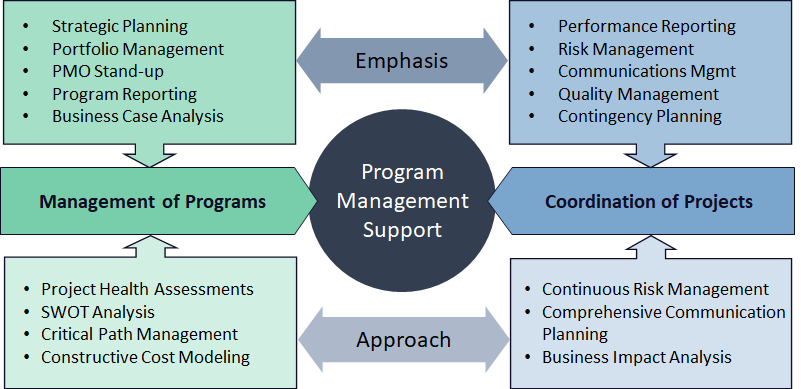Our proven approach to PMO support focuses on combining experienced, versatile staff with proven processes and tools so that they can respond efficiently and effectively to the varied needs of a PMO. Additionally, we apply industry standards and best practices, such as IEEE and PMBOK, guided by our own experience to provide the most effective combination of rigor and pragmatism. Our attention to fundamentals ensures that we remain tightly focused on the highest priority tasks at all times.
Importantly, our overall approach is based in constructive collaboration, working proactively with all stakeholders in order to facilitate program success, rather than simply identifying problems and issues.
Key elements of our approach include the following:

- Value-Added Expertise. Our approach begins with providing the right people for the task - people with a unique combination of technical knowledge and business savvy, who add real value to the program management function, and who can effectively communicate and coordinate with a broad range of stakeholders in order to facilitate program success.
- Agile Methods. Our program management approach applies Agile/Scrum techniques where appropriate to improve predictability, decrease risk, and increase the value of results. Key elements of our Agile approach include cross-functional teams, technical platforms that support collaboration and rapid iteration, daily scrums, sprint reviews, and a common definition of “done” that includes all associated artifacts.
- Supporting Tools and Templates. Our experience has taught us that good practices tend to be followed when supported with appropriate tools. We provide our projects and staff with tools and templates needed to provide customers with responsive and efficient support. We apply a wide variety of tools, methods, and standards to provide PMO support services and ensure that our staff are trained to use your established organizational tools and templates as well.
- Collaborative, Responsive, and Proactive. PMO support generally requires a high degree of interaction with numerous stakeholders across programs. Our staff have the communication skills, customer-service attitude, and specific tools to provide support that is collaborative, responsive, and proactive, including the use of structured, facilitated sessions to support stakeholder engagement, and rigorous action-item tracking to ensure follow-up by our team.
Success Stories
Department of Education OCIO PMO Support
BPS provides a variety of ED IT projects with technical support throughout the full lifecycle, from initial planning through final deployment and operation. Specific activities include concept development, business case definition, capital planning, alternatives analysis, acquisition support, implementation oversight, system verification, and performance reporting.
BPS has not only helped establish disciplined practices expected by the OCIO, but also provided innovative thinking that added significant value to all projects. For example, in OPE we quickly identified and rectified an underlying mismatch between cost accumulation and cost reporting structures, enabling the project to move from “red” to “green” status in three months. For OCO, we identified and recommended an alternative off-the-shelf technology that saved more than $1M in development costs and provided greater functionality and flexibility.
HHS Grants.gov PMO Program Technical Support
BPS provides technical support services to the Grants.gov program for development, operations, and enhancement of the Grants.gov federal grants portal. In the area of PMO support, our team facilitates strategic IT planning, prepares acquisition packages, supports budget planning and execution, prepares and delivers program communications, responds to data calls, and supports day-to-day activities of the PMO.
BPS assessments led to significant cost savings, innovations, and performance improvements, including $2M savings in virtualized server infrastructure through the use of multi-core servers, replacement of a proprietary search appliance with an open source application (Solr) to make the system “cloud ready”, leveraging cloud computing for high-volume performance testing for a 75% cost savings, using a life cycle management tool (initially Jama, now Jira) to improve IT management, using an open-source web forms framework to reduce development effort, using Cypress for fast and low cost test automation, and removing LDAP and antivirus bottlenecks for a 10x improvement in performance.